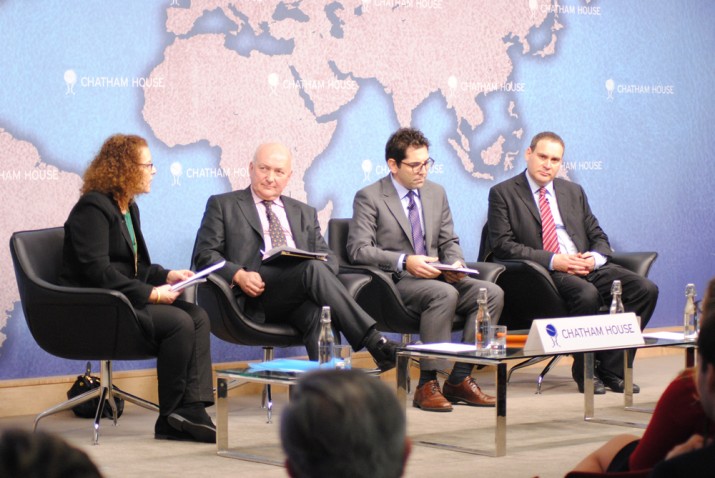UK ‘not as open’ as America on Turkey
David Reddaway, the former British ambassador in Ankara, admits his country cannot speak openly about its Turkish concerns
Former British ambassador in Ankara admits his country cannot speak openly about its Turkish concerns

Baroness Hussein-Ece, Sir David Reddaway, Türker Hamzaoğlu and Fadi Hakura were on the Chatham House panel
By Michael Daventry
A FORMER BRITISH ambassador admitted his country cannot openly criticise Turkey because it is in a different position to the more outspoken United States.
Sir David Reddaway said UK officials held “very regular meetings” with Turkish counterparts over issues like the country’s Twitter ban and the heavy-handed police response to public demonstrations.
But speaking at a London panel discussion about the recent local elections, he said his country did not join the United States in publicly criticising Turkey because “we are in a different position to the US, which is more open”.
He was responding to a question from Londra Gazete asking whether he avoided open criticism of Turkey because the UK has too many trade and military interests there.
The Foreign Office’s muted response to last year’s Gezi Park protests, where police extensively used tear gas and water cannon to disperse protesters, was described by British opposition MPs at the time as “meek”.
But Sir David insisted the UK government was always considering what was most likely to produce results. He said it was full Turkish commitment to the country’s EU membership process that would ensure the country remained anchored to the rule of law.
MEDIUM-TERM ECONOMIC CONCERNS
The panel event, held at Chatham House, the Royal Institute of International Affairs, was held a few days after the election and chaired by Baroness Hussein-Ece.
Joining Sir David on the panel was Türker Hamzaoğlu, a senior economist at Bank of America Merrill Lynch, who said foreign investors in Turkey seemed to have enjoyed the election results.
“Markets have no taste for political preferences, but they do have a taste for political stability,” he said.
But he added that he believed Turkish growth was no longer sustainable, relying too heavily on domestic demand. By looking inward politically and while depending on external economic support, there was the potential for a crash in the medium to long term, he said.
TURKISH VOTERS ARE CONSERVATIVE
But for Fadi Hakura, the Chatham House resident expert on Turkey and the third member of the panel, the reasons for the AK Party’s victory were twofold. First, he said, most of Turkey’s voters are more comfortable on the political right, not left.
Second – and despite Mr Hamzaoğlu’s economic warnings for the medium term – Fadi Hakura said the economy still catered well for voters in the short term and it was this that ensured solid AK Party support among the electorate.
“These are the bread and butter issues for Turkish voters,” he said, “and not corruption or questions of media freedom.”









